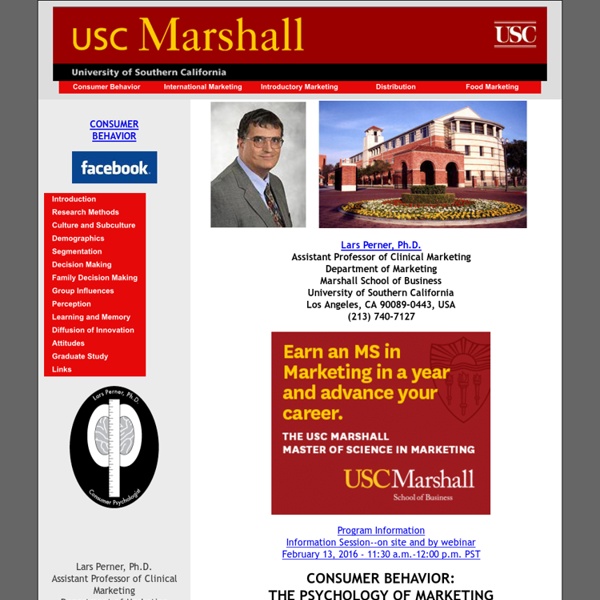



http://www.consumerpsychologist.com/
Related: MaestriaTips, Tools and Techniques for Marketers Around the Globe In Go Mobile, the book I’ve written with Jeanne Hopkins from HubSpot, we review a list of the 14 most powerful words in marketing so that readers can use them in their mobile marketing campaigns. This post gives you a sneak peak at the list that’s included in the book. Enjoy. Have you ever bought a product that you didn’t really need? You know the kind — they’re often found in the aisle displays at Lowe’s, WalMart or Barnes & Noble.
Your True Self Revealed - F You are a Considerate Analyst. personalDNA about you You are an Analyst If you want to be different: A VC: Marketing You asked for it Arnold and 84 others (so far). So I'm gonna talk about marketing. I believe that marketing is what you do when your product or service sucks or when you make so much profit on every marginal customer that it would be crazy to not spend a bit of that profit acquiring more of them (coke, zynga, bud, viagra). Stress Changes Who Men Find Attractive When men are under stress, instead of preferring women who resemble themselves as they normally do, they choose dissimilar women, researchers now find. Scientists in Germany and their colleagues had 50 men look at 30 pictures of erotic female nudes. These photos were computer-modified so their faces subtly resembled either the volunteer in question or another volunteer. All the men in question were white, clean-shaven heterosexual university students of normal weight without facial tattoos or piercings, and none of the men recognized the erotica had been computer-modified or resembled them. Before the volunteers looked at the nude pictures, they put their hands in either comfortable body-temperature water or painfully cold water. Tests of heart rate and blood pressure, as well as of saliva to check for the stress hormone cortisol, all confirmed the cold water stressed the men while the warm water did not.
30 Bizarre and Creative Packaging Design Examples Inspiration November 1, 2010 One of the things that identifies the image of a product is its packaging. Few elements like striking graphics, attractive colors, and unusual shapes are carefully thought of to come up with packaging design that catches the attention of the consumers. A packaging design is a critical component in marketing because it is the packaging that makes it stand from the rest when consumers choose a product from the shelf. Ocean Marketing: How to self-destruct your company with just a few measly emails [update] Update: A representative for the Avenger Controller (a new one, obviously) has released an official statement regarding Ocean Marketing’s involvement with their product and the actions of Paul Christoforo. Original story: Strap yourself in, you’re about to witness the most outlandlish PR blunder in video gaming history. And trust me, there have been many… From VentureBeat
The Stanford Prison Experiment: A Simulati Volunteers What suspects had done was to answer a local newspaper ad calling for volunteers in a study of the psychological effects of prison life. We wanted to see what the psychological effects were of becoming a prisoner or prison guard. To do this, we decided to set up a simulated prison and then carefully note the effects of this institution on the behavior of all those within its walls. More than 70 applicants answered our ad and were given diagnostic interviews and personality tests to eliminate candidates with psychological problems, medical disabilities, or a history of crime or drug abuse.
The Anatomy of a Perfect Landing Page Placement and Content 7. Keep It Above the Fold The space a visitor sees without having to scroll is where the most important parts of the webpage should be. Seven Myths About Transmedia Storytelling Debunked Over the past few years, transmedia storytelling has become a hot buzzword in Hollywood and Madison Avenue alike--"the next big thing" or "the last big thing" depending on whom you ask. Last year, the Producer's Guild announced a new job title, Transmedia Producer, a decision that has more or less established the term as an industry standard. More and more companies are laying claim to expertise in producing transmedia content. But many using the term don't really understand what they are saying. So let's look at what people are getting wrong about transmedia. Myth 1: Transmedia Storytelling refers to any strategy involving more than one media platform.
Power of Language - I’m Sorry, I Don’t Know, I Can’t Photo by Vanessa Paxton I find myself blurting out I don’t know as an instant answer to questions I don’t have immediate answers for. Lately, I’ve been noting how these simple words made me feel, and I’m starting to take notice that on some level, these casual words are effecting my emotions and self-esteem. Fortune 500 Mission Statements Fortune 500 companies are the biggest and best run in the nation. That's because they remain tightly focused on delivering quality in a competitive market. If you want to learn from the best, there are plenty of lessons waiting in these mission statements. 6443 Iron Bridge Road Richmond, VA 23234